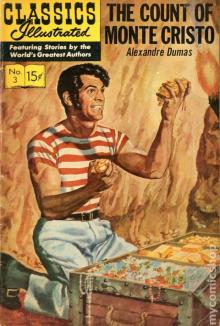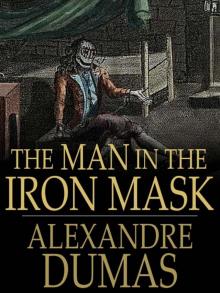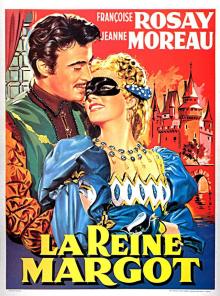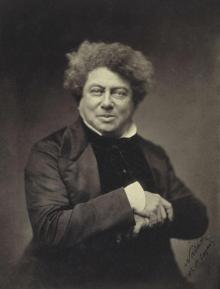- Home
- Alexandre Dumas
Three Musketeers (Barnes & Noble Classics Series) Page 13
Three Musketeers (Barnes & Noble Classics Series) Read online
Page 13
Louis XIII appeared, walking fast. He was in hunting costume covered with dust, wearing large boots, and holding a whip in his hand. At the first glance D’Artagnan judged that the mind of the king was stormy.
This disposition, visible as it was in his Majesty, did not prevent the courtiers from ranging themselves along his pathway. In royal antechambers it is worth more to be viewed with an angry eye than not to be seen at all. The three Musketeers therefore did not hesitate to make a step forward. D’Artagnan on the contrary remained concealed behind them; but although the king knew Athos, Porthos, and Aramis personally, he passed before them without speaking or looking—indeed, as if he had never seen them before. As for M. de Tréville, when the eyes of the king fell upon him, he sustained the look with so much firmness that it was the king who dropped his eyes; after which his Majesty, grumbling, entered his apartment.
“Matters go but badly,” said Athos, smiling; “and we shall not be made Chevaliers of the Orderi this time.”
“Wait here ten minutes,” said M. de Tréville; “and if at the expiration of ten minutes you do not see me come out, return to my hotel, for it will be useless for you to wait for me longer.”
The four young men waited ten minutes, a quarter of an hour, twenty minutes; and seeing that M. de Tréville did not return, went away very uneasy as to what was going to happen.
M. de Tréville entered the king’s cabinet boldly, and found his Majesty in a very ill humor, seated on an armchair, beating his boot with the handle of his whip. This, however, did not prevent his asking, with the greatest coolness, after his Majesty’s health.
“Bad, monsieur, bad!” replied the king; “I am bored.”
This was, in fact, the worst complaint of Louis XIII, who would sometimes take one of his courtiers to a window and say, “Monsieur So-and-so, let us weary ourselves together.”
“How! your Majesty is bored? Have you not enjoyed the pleasures of the chase today?”
“A fine pleasure, indeed, monsieur! Upon my soul, everything degenerates; and I don’t know whether it is the game which leaves no scent, or the dogs that have no noses. We started a stag of ten branches. We chased him for six hours, and when he was near being taken—when St.-Simon14 was already putting his horn to his mouth to sound the halali—crack, all the pack takes the wrong scent and sets off after a two-year-older. I shall be obliged to give up hunting, as I have given up hawking. Ah, I am an unfortunate king, Monsieur de Tréville! I had but one gerfalcon, and he died day before yesterday.“
“Indeed, sire, I wholly comprehend your disappointment. The misfortune is great; but I think you have still a good number of falcons, sparrow hawks, and tiercets.”
“And not a man to instruct them. Falconers are declining. I know no one but myself who is acquainted with the noble art of venery. After me it will be all over, and people will hunt with gins, snares, and traps. If I had but the time to train pupils! But there is the cardinal always at hand, who does not leave me a moment’s repose; who talks to me about Spain, who talks to me about Austria, who talks to me about England! Ah! à propos of the cardinal, Monsieur de Tréville, I am vexed with you.”
This was the chance at which M. de Tréville waited for the king. He knew the king of old, and he knew that all these complaints were but a preface—a sort of excitation to encourage himself—and that he had now come to his point at last.
“And in what have I been so unfortunate as to displease your Majesty?” asked M. de Tréville, feigning the most profound astonishment.
“Is it thus you perform your charge, monsieur?” continued the king, without directly replying to De Tréville’s question. “Is it for this I name you captain of my Musketeers, that they should assassinate a man, disturb a whole quarter, and endeavor to set fire to Paris, without your saying a word? But yet,” continued the king, “undoubtedly my haste accuses you wrongfully; without doubt the rioters are in prison, and you come to tell me justice is done.”
“Sire,” replied M. de Tréville, calmly, “on the contrary, I come to demand it of you.”
“And against whom?” cried the king.
“Against calumniators,” said M. de Tréville.
“Ah! this is something new,” replied the king. “Will you tell me that your three damned Musketeers, Athos, Porthos, and Aramis, and your youngster from Béarn, have not fallen, like so many furies, upon poor Bernajoux, and have not maltreated him in such a fashion that probably by this time he is dead? Will you tell me that they did not lay siege to the hotel of the Duc de la Trémouille, and that they did not endeavor to burn it?—which would not, perhaps, have been a great misfortune in time of war, seeing that it is nothing but a nest of Huguenots, but which is, in time of peace, a frightful example. Tell me, now, can you deny all this?”
“And who has told you this fine story, sire?” asked Tréville, quietly.
“Who has told me this fine story, monsieur? Who should it be but he who watches while I sleep, who labors while I amuse myself, who conducts everything at home and abroad—in France as in Europe?”
“Your Majesty probably refers to God,” said M. de Tréville; “for I know no one except God who can be so far above your Majesty.”
“No, monsieur; I speak of the prop of the state, of my only servant, of my only friend—of the cardinal.”
“His Eminence is not his Holiness, sire.”
“What do you mean by that, monsieur?”
“That it is only the Pope who is infallible,15 and that this infallibility does not extend to cardinals.”
“You mean to say that he deceives me; you mean to say that he betrays me? You accuse him, then? Come, speak; avow freely that you accuse him!”
“No, sire; but I say that he deceives himself. I say that he is ill-informed. I say that he has hastily accused your Majesty’s Musketeers, toward whom he is unjust, and that he has not obtained his information from good sources.”
“The accusation comes from Monsieur de la Trémouille, from the duke himself. What do you say to that?”
“I might answer, sire, that he is too deeply interested in the question to be a very impartial witness; but so far from that, sire, I know the duke to be a royal gentleman, and I refer the matter to him-but upon one condition, sire.”
“What?”
“It is that your Majesty will make him come here, will interrogate him yourself, tête-à-tête, without witnesses, and that I shall see your Majesty as soon as you have seen the duke.”
“What, then! you will bind yourself,” cried the king, “by what Monsieur de la Trémouille shall say?”
“Yes, sire.”
“You will accept his judgment?”
“Undoubtedly.”
“And you will submit to the reparation he may require?”
“Certainly.”
“La Chesnaye!” cried the king. “La Chesnaye!”
Louis XIII’s confidential valet, who never left the door, entered in reply to the call.
“La Chesnaye,” said the king, “let someone go instantly and find Monsieur de la Trémouille; I wish to speak with him this evening.”
“Your Majesty gives me your word that you will not see anyone between Monsieur de la Trémouille and myself?”
“Nobody, by the faith of a gentleman.”
“Tomorrow, then, sire?”
“Tomorrow, monsieur.”
“At what o’clock, please your Majesty?”
“At any hour you will.”
“But in coming too early I should be afraid of awakening your Majesty.”
“Awaken me! Do you think I ever sleep, then? I sleep no longer, monsieur. I sometimes dream, that’s all. Come, then, as early as you like—at seven o’clock; but beware, if you and your Musketeers are guilty.”
“If my Musketeers are guilty, sire, the guilty shall be placed in your Majesty’s hands, who will dispose of them at your good pleasure. Does your Majesty require anything further? Speak, I am ready to obey.”
“No, monsieur, no;
I am not called Louis the Just without reason. Tomorrow, then, monsieur—tomorrow.”
“Till then, God preserve your Majesty!”
However ill the king might sleep, M. de Tréville slept still worse. He had ordered his three Musketeers and their companion to be with him at half past six in the morning. He took them with him, without encouraging them or promising them anything, and without concealing from them that their luck, and even his own, depended upon this cast of the dice.
Arrived at the foot of the back stairs, he desired them to wait. If the king was still irritated against them, they would depart without being seen; if the king consented to see them, they would only have to be called.
On arriving at the king’s private antechamber, M. de Tréville found La Chesnaye, who informed him that they had not been able to find M. de la Trémouille on the preceding evening at his hotel, that he returned too late to present himself at the Louvre, that he had only that moment arrived, and that he was at that very hour with the king.
This circumstance pleased M. de Tréville much, as he thus became certain that no foreign suggestion could insinuate itself between M. de la Trémouille’s testimony and himself.
In fact, ten minutes had scarcely passed away when the door of the king’s closet opened, and M. de Tréville saw M. de la Trémouille come out. The duke came straight up to him, and said: “Monsieur de Tréville, his Majesty has just sent for me in order to inquire respecting the circumstances which took place yesterday at my hotel. I have told him the truth; that is to say, that the fault lay with my people, and that I was ready to offer you my excuses. Since I have the good fortune to meet you, I beg you to receive them, and to hold me always as one of your friends.”
“Monsieur the Duke,” said M. de Tréville, “I was so confident of your loyalty that I required no other defender before his Majesty than yourself. I find that I have not been mistaken, and I thank you that there is still one man in France of whom may be said, without disappointment, what I have said of you.”
“That’s well said,” cried the king, who had heard all these compliments through the open door; “only tell him, Tréville, since he wishes to be considered your friend, that I also wish to be one of his, but he neglects me; that it is nearly three years since I have seen him, and that I never do see him unless I send for him. Tell him all this for me, for these are things which a king cannot say for himself.”
“Thanks, sire, thanks,” said the duke; “but your Majesty may be assured that it is not those—I do not speak of Monsieur de Tréville—whom your Majesty sees at all hours of the day that are the most devoted to you.
“Ah! you have heard what I said? So much the better, Duke, so much the better,” said the king, advancing toward the door. “Ah! it is you, Tréville. Where are your Musketeers? I told you the day before yesterday to bring them with you; why have you not done so?”
“They are below, sire, and with your permission La Chesnaye will bid them come up.”
“Yes, yes, let them come up immediately. It is nearly eight o’clock, and at nine I expect a visit. Go, Monsieur Duke, and return often. Come in, Tréville.”
The Duke saluted and retired. At the moment he opened the door, the three Musketeers and D’Artagnan, conducted by La Chesnaye, appeared at the top of the staircase.
“Come in, my braves,” said the king, “come in; I am going to scold you.”
The Musketeers advanced, bowing, D’Artagnan following closely behind them.
“What the devil!” continued the king. “Seven of his Eminence’s Guards placed hors de combatj by you four in two days! That’s too many, gentlemen, too many! If you go on so, his Eminence will be forced to renew his company in three weeks, and I to put the edicts in force in all their rigor. One now and then I don’t say much about; but seven in two days, I repeat, it is too many, it is far too many!”
“Therefore, sire, your Majesty sees that they are come, quite contrite and repentant, to offer you their excuses.”
“Quite contrite and repentant! Hem!” said the king. “I place no confidence in their hypocritical faces. In particular, there is one yonder of a Gascon look. Come hither, monsieur.”
D’Artagnan, who understood that it was to him this compliment was addressed, approached, assuming a most deprecating air.
“Why, you told me he was a young man? This is a boy, Tréville, a mere boy! Do you mean to say that it was he who bestowed that severe thrust at jussac?”
“And those two equally fine thrusts at Bernajoux.”
“Truly! ”
“Without reckoning,” said Athos, “that if he had not rescued me from the hands of Cahusac, I should not now have the honor of making my very humble reverence to your Majesty.”
“Why, he is a very devil, this Béarnais! Ventre-saint-gris,k Monsieur de Tréville, as the king my father would have said. But at this sort of work, many doublets must be slashed and many swords broken. Now, Gascons are always poor, are they not?”
“Sire, I can assert that they have hitherto discovered no gold mines in their mountains; though the Lord owes them this miracle in recompense for the manner in which they supported the pretensions of the king your father.”
“Which is to say that the Gascons made a king of me, myself, seeing that I am my father’s son, is it not, Tréville? Well, happily, I don’t say nay to it. La Chesnaye, go and see if by rummaging all my pockets you can find forty pistoles; and if you can find them, bring them to me. And now let us see, young man, with your hand upon your conscience, how did all this come to pass?”
D’Artagnan related the adventure of the preceding day in all its details: how, not having been able to sleep for the joy he felt in the expectation of seeing his Majesty, he had gone to his three friends three hours before the hour of audience; how they had gone together to the tennis court, and how, upon the fear he had manifested lest he receive a ball in the face, he had been jeered at by Bernajoux, who had nearly paid for his jeer with his life, and M. de la Trémouille, who had nothing to do with the matter, with the loss of his hotel.
“This is all very well,” murmured the king; “yes, this is just the account the duke gave me of the affair. Poor cardinal! Seven men in two days, and those of his very best! But that’s quite enough, gentlemen; please to understand, that’s enough. You have taken your revenge for the Rue Férou, and even exceeded it; you ought to be satisfied.”
“If your Majesty is so,” said Tréville, “we are.”
“Oh, yes; I am,” added the king, taking a handful of gold from La Chesnaye, and putting it into the hand of D’Artagnan. “Here,” said he, “is a proof of my satisfaction.”
At this epoch, the ideas of pride which are in fashion in our days did not prevail. A gentleman received, from hand to hand, money from the king, and was not the least in the world humiliated. D’Artagnan put his forty pistolesl into his pocket without any scruple—on the contrary, thanking his Majesty greatly.
“There,” said the king, looking at a clock, “there, now, as it is half past eight, you may retire; for, as I told you, I expect someone at nine. Thanks for your devotedness, gentlemen. I may continue to rely upon it, may I not?”
“Oh, sire!” cried the four companions, with one voice, “we would allow ourselves to be cut to pieces in your Majesty’s service.”
“Well, well, but keep whole; that will be better, and you will be more useful to me. Tréville,” added the king, in a low voice, as the others were retiring, “as you have no room in the Musketeers, and as we have besides decided that a novitiate is necessary before entering that corps, place this young man in the company of the Guards of Monsieur Dessessart, your brother-in-law. Ah, pardieu,m Tréville! I enjoy beforehand the face the cardinal will make. He will be furious; but I don’t care. I am doing what is right.”
The king waved his hand to Tréville, who left him and rejoined the Musketeers, whom he found sharing the forty pistoles with D’Artagnan.
The cardinal, as his Majesty had said, was really fu
rious, so furious that during eight days he absented himself from the king’s gaming table. This did not prevent the king from being as complacent to him as possible whenever he met him, or from asking in the kindest tone, “Well, Monsieur Cardinal, how fares it with that poor Jussac and that poor Bernajoux of yours?”
7
THE INTERIOR OF “THE MUSKETEERS”
When D’Artagnan was out of the Louvre, and consulted his friends upon the use he had best make of his share of the forty pistoles, Athos advised him to order a good repast at the Pomme-de-Pin, Porthos to engage a lackey, and Aramis to provide himself with a suitable mistress.
The repast was carried into effect that very day, and the lackey waited at table. The repast had been ordered by Athos, and the lackey furnished by Porthos. He was a Picard, whom the glorious Musketeer had picked up on the Bridge Tournelle, making rings and plashing in the water.
Porthos pretended that this occupation was a proof of a reflective and contemplative organization, and he had brought him away without any other recommendation. The noble carriage of this gentleman, for whom he believed himself to be engaged, had won Planchet—that was the name of the Picard. He felt a slight disappointment, however, when he saw that this place was already taken by a compeer named Mousqueton, and when Porthos signified to him that the state of his household, though great, would not support two servants, and that he must enter into the service of D‘Artagnan. Nevertheless, when he waited at the dinner given by his master, and saw him take out a handful of gold to pay for it, he believed his fortune made, and returned thanks to heaven for having thrown him into the service of such a Crœsus. He preserved this opinion even after the feast, with the remnants of which he repaired his own long abstinence; but when in the evening he made his master’s bed, the chimeras of Planchet faded away. The bed was the only one in the apartment, which consisted of an antechamber and a bedroom. Planchet slept in the antechamber upon a coverlet taken from the bed of D’Artagnan, and which D’Artagnan from that time made shift to do without.

 The Count of Monte Cristo, Illustrated
The Count of Monte Cristo, Illustrated Knight of Maison-Rouge
Knight of Maison-Rouge![The Three Musketeers - Alexandre Dumas - [Full Version] - (ANNOTATED) Read online](http://i1.bookreadfree.com/14/the_three_musketeers_-_alexandre_dumas_-_[full_version]_-_annotated_preview.jpg) The Three Musketeers - Alexandre Dumas - [Full Version] - (ANNOTATED)
The Three Musketeers - Alexandre Dumas - [Full Version] - (ANNOTATED) The Man in the Iron Mask
The Man in the Iron Mask The Count of Monte Cristo (Penguin Classics eBook)
The Count of Monte Cristo (Penguin Classics eBook) Count of Monte Cristo (abridged) (Barnes & Noble Classics Series)
Count of Monte Cristo (abridged) (Barnes & Noble Classics Series) The Women's War
The Women's War La reine Margot. English
La reine Margot. English The Vicomte de Bragelonne
The Vicomte de Bragelonne__english_preview.jpg) La dame aux camélias (Novel). English
La dame aux camélias (Novel). English The Count of Monte Cristo
The Count of Monte Cristo Balsamo, the Magician; or, The Memoirs of a Physician
Balsamo, the Magician; or, The Memoirs of a Physician Ten Years Later
Ten Years Later The Romance of Violette
The Romance of Violette The Mesmerist's Victim
The Mesmerist's Victim Vingt ans après. English
Vingt ans après. English Le collier de la reine. English
Le collier de la reine. English Taking the Bastile; Or, Pitou the Peasant
Taking the Bastile; Or, Pitou the Peasant The Hero of the People: A Historical Romance of Love, Liberty and Loyalty
The Hero of the People: A Historical Romance of Love, Liberty and Loyalty Louise de la Valliere
Louise de la Valliere Les Quarante-cinq. English
Les Quarante-cinq. English Ange Pitou (Volume 1)
Ange Pitou (Volume 1) The Royal Life Guard; or, the flight of the royal family.
The Royal Life Guard; or, the flight of the royal family. Les trois mousquetaires. English
Les trois mousquetaires. English Une fille du régent. English
Une fille du régent. English The Knight of Maison-Rouge
The Knight of Maison-Rouge The Count of Monte Cristo (Unabridged Penguin)
The Count of Monte Cristo (Unabridged Penguin) Ange Pitou
Ange Pitou The Romance of Violette (vintage erotica)
The Romance of Violette (vintage erotica) The Three Musketeers
The Three Musketeers Three Musketeers (Barnes & Noble Classics Series)
Three Musketeers (Barnes & Noble Classics Series) Georges
Georges Man in the Iron Mask (Barnes & Noble Classics Series)
Man in the Iron Mask (Barnes & Noble Classics Series) The Red Sphinx
The Red Sphinx